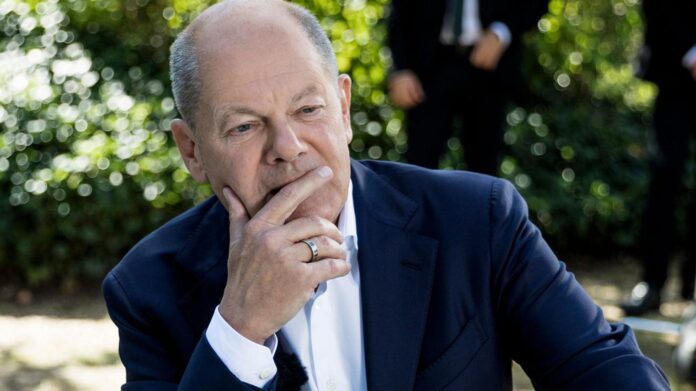
Ahead of possible new migration consultations between the government, the opposition and the states, Chancellor Olaf Scholz is approaching the Union. In the ZDF summer interview, he took up their demand for controls and rejections at the borders. “We already have rejections at the border, we already have border controls, and effective border management is something that we would like to develop further, also with the support of the opposition.”
The SPD politician had previously said at a public meeting in Teltow, Brandenburg: “It won’t be our fault if it doesn’t work.” And: “I hope it works because it would be good for society and peace.”
Scholz announces “good proposals”
A new migration discussion is planned for this Tuesday. CDU leader Friedrich Merz has, however, declared that the Union’s representatives will only take part if the traffic light coalition agrees to immediate controls and rejections at the borders. Scholz did not do this directly in the ZDF summer interview, but he announced: “There will be good proposals (…), all of which are within the framework of European laws, international treaties and our constitution.”
Traffic light coalition wants to pass security law quickly
Before the new round of talks, the coalition presented a draft law to implement its security pact. “We have delivered,” said Federal Minister of the Interior Nancy Faeser (SPD) to the German Press Agency in Berlin, referring to the draft law, which was completed just over a week after the security package was announced. “We are providing more protection against Islamist terror, stricter deportations of violent offenders, knife bans and facial recognition of criminals.”
The traffic light coalition now wants to quickly push the law, which it is using to respond to the Islamist-motivated terrorist attack in Solingen, which left three people dead and eight injured, through the Bundestag – and thus signal its ability to act before the state elections in Brandenburg on September 22nd.
Federal Justice Minister Marco Buschmann (FDP) believes that initial discussions in the Bundestag are possible as early as this week. “It is now up to Parliament to get everything underway quickly,” he said. “I continue to advocate for a high speed.”
Union calls for further steps
The CDU/CSU opposition had already made it clear when presenting the security package at the end of August that it considered the planned measures to be inadequate. The deputy leader of the Union parliamentary group, Jens Spahn, has now again insisted on border controls and rejections on Deutschlandfunk. “We can and must protect our border,” he said. The fact that rejections at the border are possible is basically largely undisputed. “It is a question of political will.”
On the sidelines of a visit to Thessaloniki, Greece, Federal Minister of Economics Robert Habeck (Greens) called on the Union to take a “solid” course in migration policy.
Steinmeier calls on parties to be willing to compromise
With a view to this potentially decisive week for the migration consultations, Federal President Frank-Walter Steinmeier called on all parties involved to be willing to compromise. He said in Berlin that he was following the ongoing migration talks with the expectation of an agreement between the government and the largest opposition party.
“I am convinced that it is up to the parties of the democratic center to develop solutions to questions that concern many citizens,” stressed Steinmeier. “It requires a nationwide effort – across party lines and government levels.”
Security package contains bundle of measures
Among other things, the traffic light government wants to cut benefits for asylum seekers whose procedures are the responsibility of another European state that agrees to take the person back. It wants to make it easier to deport refugees who have committed a crime with a weapon or other dangerous tool. Migrants who commit crimes should be more easily excluded from protection in Germany. Anyone who returns to their home country without a valid reason, for example for a holiday, should also lose their protection status.
To increase safety, it is planned to further restrict the use of knives in public spaces. A general knife ban is to apply on long-distance bus and train travel, at folk festivals and other large events. There is also to be a ban on switchblades – with exceptions for hunters, for example.
It is also planned to expand the powers of the security authorities in the fight against Islamism. In future, investigative authorities will be able to biometrically compare publicly available images with photos of suspects or wanted persons. This facial recognition should make it easier to identify wanted persons.
Introduction of the bill by parliamentary groups
The draft bill from the Interior Ministry was sent to the three traffic light parliamentary groups as a drafting aid. They usually adopt such drafting aids and then submit them to the Bundestag as their own draft bill. Sometimes they make changes beforehand. This route is chosen to speed up the process. According to the Basic Law, proposals from the federal government must first be submitted to the Bundesrat. This step is not necessary for proposals from parliamentary groups.
© dpa-infocom, dpa:240908-930-226705/1
This is a message directly from the dpa news channel.
